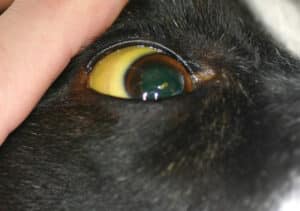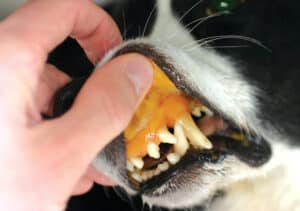The liver is a vital organ – animals and people cannot survive without their livers.
The liver performs many complex functions that are essential to life and good health. Its main functions are:
- To convert food into useful substances such as proteins for repair and growth of the body
- To maintain normal functions such as blood clotting, fighting infection and secretion of substances to the bloodstream
- Bile production, which assists with the absorption of fat and certain vitamins
- To store the body’s primary sugar (glucose) as glycogen and be able to release it into the bloodstream when it is needed
- To neutralise and break down toxic substances such as chemicals and some medications, for later elimination in bile or through the kidneys
What is acute liver failure?
Acute liver failure occurs when a previously healthy animal rapidly develops a liver that fails to work. Because the vital functions of the liver can be lost over a very short period the patient can deteriorate fast, needing treatment within hours or days.
The liver is very good at regenerating itself (unlike other organs such as the kidneys), but serious damage to the liver can cause a rapid failure of its function – this is known as acute liver failure. Over 75% of the liver is usually damaged before liver failure occurs.
Acute liver failure can be caused by:
- Over 900 poisons or toxins (e.g. sago plant, mushrooms, moulds, insects, atypical drug reactions, paracetamol, environmental chemicals)
- Cancer
- Infections (e.g. bacteria such as leptospirosis, viruses, parasites e.g. protozoa, fungal infection)
- Blood clots
- Blood vessel abnormalities (e.g. congenital portosystemic shunt – an abnormal blood vessel that by-passes the liver)
- ‘Fatty liver syndrome’ in cats
What are the signs of acute liver failure?
- Reduced appetite
- Lethargy
- Increased thirst
- Strange behaviours (due to a build-up of toxins in the blood that affect the brain)
- Vomiting
- Diarrhoea – occasionally blood in the stools, or dark tarry stools
- Bloated abdomen (tummy)
- Bruising or bleeding gums
- Yellow skin, urine, gums (jaundice)

Symptoms of acute liver failure include yellow eyes…

…and yellow gums (jaundice)
How is acute liver failure diagnosed?
Liver failure is diagnosed after careful consideration of the patient’s history, a full physical examination and by carrying out blood and urine tests which indicate dysfunction of the liver. Further investigations, such as an ultrasound scan, urine cultures, blood cultures or specific tests for infections may be required in individual cases.
How is acute liver failure treated?
Acute liver failure requires intensive treatment. It is important to try to remove any underlying cause if possible (e.g. a poison or toxin). The best treatment outcome occurs when the problem is recognised and treated early. Patients with acute liver failure are generally very ill and invariably need to be admitted into hospital where they will require intensive care and intensive, individualised treatments including:
- Intravenous fluids
- Antacids
- Treatment of potential infections
- Regulation of blood pressure
- Treatment of blood clotting abnormalities
- Prevention of seizures
- Stabilisation of salts in the blood (electrolytes) and the balance of the acidity of the blood and tissues
- Drugs which help to protect the liver and its function (hepatic protectants)
- Feeding – nutritional support is important and is overseen by our on-site nutritionist veterinary surgeon
NDSR has a superbly equipped High Dependency Care facility and highly trained staff who are able to provide the intensive 24 hour a day veterinary and nursing care which patients in acute liver failure require.
What is the long term outlook?
Considering the severity of this disease process, this is a challenging condition to treat. Early intervention and aggressive treatment can be successful in some cases where the extent of damage is not too severe. At the present time, liver transplants are not available in veterinary medicine.
If your pet develops acute liver failure, we will discuss the treatment options in detail with you and give you the help you need in making decisions about what you wish us to do to help your pet.
If you have any queries or concerns, please do not hesitate to contact us.
Arranging a referral for your pet
If you would like to refer your pet to see one of our Specialists please visit our Arranging a Referral page.